At 67, Michael Kish of Nutley, New Jersey, is a relative newbie to masters track. He took up the sport at 59, taking advice to check out the New Jersey Senior Olympics. So when he deciubded to enter Malaga in the 100 and 200, he naturally wondered about running a relay.
In late July, Michael wrote USA Team Manager Phil Greenwald, who graciously replied, discussing the difficulty of saying whether he would be on a foursome.
Phil concluded his 400-word note: “My advice is always to plan your trip around your individual events; if you are available for the relays and we have a slot for you, that is a bonus. Unfortunately, there are so many things outside your control that planning on running a relay is not a good strategy.”Unfortunately, Phil didn’t share details on how Michael could submit his name in Spain to be part of a relay. So the 1969 Essex Catholic graduate (and teammate of Marty Liquori) saw the week gap between the 200 final and the relays, sighed and made plans to visit Madrid with his wife, Jean, and fly home the Sunday of the relays.
Oops.
Michael, who submitted his Penn Relays 100 time of 12.94 to Malaga, won his heat Sept. 5 in 12.96. The next day, he won his semifinal in a legal 12.75 and took silver in 12.91 behind British legend Steve Peters. (Third was American David Craig in 13.16, who didn’t run the M65 relay either). On Sept. 9, Michael won bronze in the 200 (27.01) behind Steve and David.
But in a phone chat Thursday, Michael told me that while in Malaga, “no one said anything to me about the relays — none.” He received no email from the Team Selection Committee either. (He said his T-Mobile account worked fine.)
He attended a 10:30 a.m. team meeting the first Tuesday — before the 100 final — but heard nothing about how to apply for a relay. He also was staying at a downtown Marriott and didn’t have access to Team USA leaders at the Hilton Garden Inn.Michael says he had a short chat with someone I took to be USATF Masters Vice Chair Jerry Bookin-Weiner about how to arrange for physical therapy, but got no info about the relays.
“Nobody approached me,” Michael said. “I was out of the loop for the whole thing.”
He would have changed his Madrid plans had he known he was a slam-dunk for the M65 relay — where M70 Charles Allie dropped down for a world-record attempt.
“I wanted to run,” he said. “I was willing to come back [to Malaga] … I could have been running if the relay wanted me to run.” And he would have changed his flight home to Monday as well, he told me.
Hearing nothing from anybody, Michael and Jean “just let it go” and didn’t learn of the relay controversy until getting home to New Jersey, where he’s been retired for three years after a 38-year career in special education.
His reaction to the Charlie dropdown and WR attempt?“Everyone wants to run a world record and get medals,” Michael said. “But I think this kind of situation may have gotten out of hand.”
When he asked in July about relay opportunities, and “nobody gave me a good answer… I decided: Well, I’ll just not run [the relay]. That week gap [between the 200 and relay] kind of threw me.”
Michael stressed several times that he isn’t angry or “vilifying” anyone.
In a follow-up email, Michael wrote me:
In retrospect to all that has transpired related to the M65 relay selections and myself not being part of the relay, as I said I’m not angry just disappointed. It’s disappointing because there seems to have been not just a lack of information/communication as you indicated, but the best 100/200m 65s didn’t get to run as a group.
It would have been gratifying to know that the 65s were chosen based on our performances at Malaga, as well as during our performance times during the summer. I’m unsure about the 65s breaking any world or American record if I was on it, but I’m fairly confident that we would still have come in first, barring any injury. And yes, I would have liked to have made an attempt at any record with just the 65s. Who wouldn’t?
As to not being contacted by anyone to run the relay and all that transpired in selecting the 65 team after reading your articles, participants responses to Roger’s issues on how the relay teams were selected, and my relay issues, I have reflected on these issues this way: I’m more then pleased with my performances placing second and third in the 100/200m in Malaga and proud having represented my country and bringing home two medals. Regardless, it was a fun experience despite the relay issues.
On the phone, Michael said he’s leaning toward running the WMA regional Toronto meet in 2019 (as he did last year). And 2020 worlds, of course. (He’s ranked third in the world this year in the M65 100 after WR man Damien Leake and Steve Peters.)
He’ll be ready for entering the relay pool.
Contribute to support independent track and field journalism:

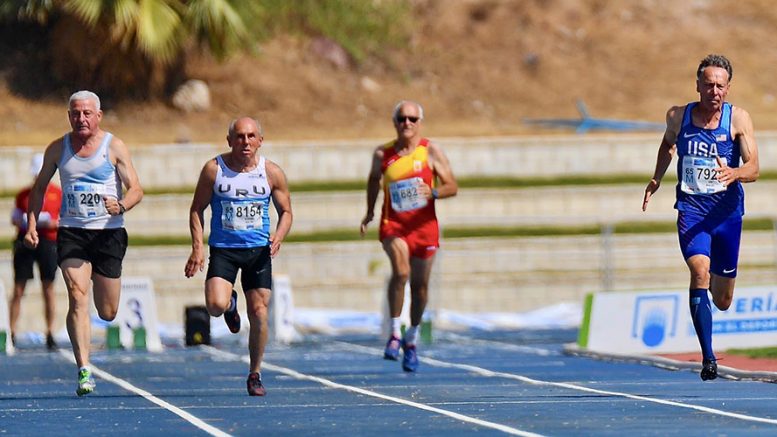
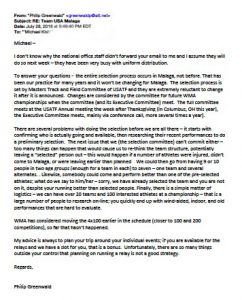
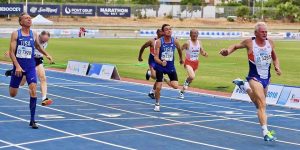
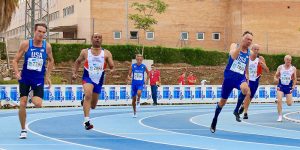
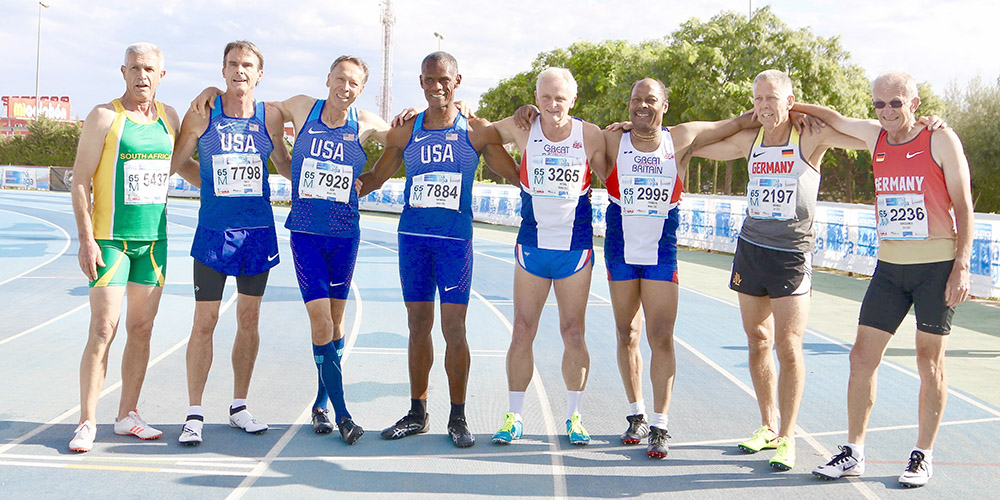
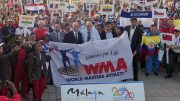
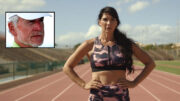

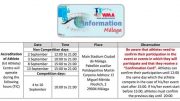
WMA Relay team selection:
Apparantly there is a relay form each individual needs to fill out to be considered to be on the USA masters relay team. Completed Form is given to relay team manager.
http://www.usatf.org/Events—Calendar/2018/World-Masters-Athletics-Outdoor-Championships/Athlete-Info/Relay-Selection.aspx
Great for Michael that he didn’t compete until age 59 but is already a man to be feared. I’m proud of him, as I am of Damien Leake, George Haywood, David Craig, Oscar Peyton, the legendary Bill Collins, and other standouts in this packed age group.
As far as relay selection, it seems to resemble the issue of record ratification, something I’ve been talking about for many years. I hope we can strengthen the process of selection to the point that everyone is satisfied.
On a personal note, I’m sad to say that I’ve been the victim of a clever hacker who has actually taken over my email address. Note to masters athletes: If I send you an email it will reference something about your background — perhaps you went to Dickinson College and Columbia University, for example — and will not include any attachments. If you get something that does not fit, please delete it in its entirety, although it may well come in as spam. Spread the word.
One should not have to stay at the team hotel to receive communications from the team managers nor should one have to attend the daily team meetings either. In Malaga the daily team meetings were held at the so-called main stadium. That was one of 4 stadiums where events were scheduled. The “main stadium” was “main” in name only -many events were held elsewhere and the distance between those other venues and the “main stadium was such that it was not easy to go to the main stadium for the team meeting and also participate or spectate at the other venues. There needs to be a better way to provide information to USA team members other than tell them to go to the daily 10 am team meeting or hope that someone puts information on Whatsap. If one is new or relatively new to the WMA meets one does not always know what is going on nor how to find out information. A better way to provide daily information to team members needs to be devised . As for the relays and the relay sheets – I handed them out to a couple of athletes in my age group to make sure that they were aware and would be considered for the age group relays. If one does not stay at the team hotel it can become very difficult to know what is going on. It should not be a requirement that all team athletes stay at the team hotel in order to get information. It might be as simple as a daily email to all Team USA members about what was brought up at the daily team meeting and about such things as how to apply to be on a relay team – and even a copy of the sheet that needs to be filled out and where to submit it. All of this could be done electronically and even us “old folks” use cell phones, email, and text messaging and some – believe it or not – even used Whatsap”.
I don’t think it’s so much to ask, to volunteer for a place on a relay team, if you’re interested. I do agree with Mary, problems with team communication in Malaga showed some areas where there’s room for improvement. I think this was the first use of Whatsapp; our experience was, we were inundated with messages, 99% of no interest to us in particular. Making it to a team meeting would have meant, two $15 taxi rides, plus time spent; consequently, we didn’t make any of them. As in all aspects of life, I’m sure we’ll all learn and improve, going forward.